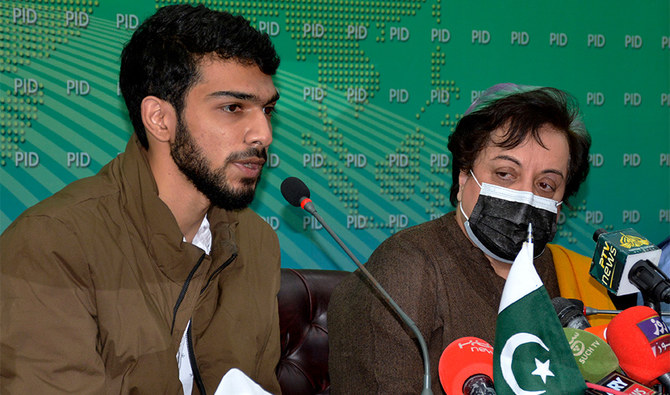ISLAMABAD: The family of a prominent pro-freedom leader from Indian Occupied Kashmir (IOK) who is being held in a New Delhi jail on trumped-up charges of anti-state activities has appealed to the United Nations for help in securing her release.
Ahmad bin Qasim — the son of Asiya Andrabi, chief of a pro-freedom group Dukhtaran-i-Milat (Daughters of the Muslim Faith) — was joined by Minister for Human Rights Shireen Mazari on Monday in issuing the appeal during a news conference in Islamabad.
Andrabi and two other woman activists, Sofi Fahmeeda and Nahida Nasreen, were charged by a court in India last month.
Andrabi’s group generally campaigns against perceived acts of immorality in Kashmir, India’s only Muslim-majority state.
During the presser, her son — who is studying in Pakistan — and Mazari criticised Indian forces for committing grave human rights violations in held Kashmir and called on international rights organisations to work for Andrabi’s release and the release of other women jailed in India.
Qasim said his mother suffers from asthma and in need of medical care.
Qasim’s father, Ashiq Hussain Faktoo, was a Kashmiri pro-freedom fighter. Indian authorities convicted him of murder in the death of a human rights activist in occupied Kashmir.
Pakistan wants India to drop charges against Andrabi and her husband and release them.
Last Sunday, through a statement, Foreign Office (FO) spokesperson Zahid Hafeez Chaudhri said Pakistan has urged the UN secretary general António Guterres and the UN high commissioner for human rights Michelle Bachelet to seek Andrabi’s immediate release.
“It has been highlighted that Ms Andrabi’s life is in danger owing to imminent risk of persecutory conviction by a sham court on 18 January 2020,” the statement read.
Pakistan and India have a history of bitter relations and have fought two of their three wars over Kashmir since gaining independence from Britain in 1947.
Relations between the two countries have been further strained since August 2019, when India revoked the Muslim-majority region’s semi-autonomous status through a controversial decree and divided it into two federally governed territories, touching off anger on both sides of the frontier.
India has an estimated 700,000 soldiers in held Kashmir, fighting nearly a dozen pro-freedom groups since 1947. In many areas, soldiers are in full combat gear patrolling streets and frisking civilians. More than 68,000 people, most of them civilians, have been killed in the conflict in the last few decades.




